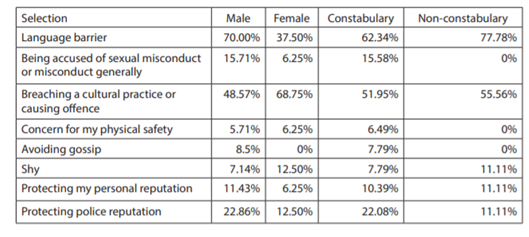Author: Bibby, Claire1
Published in National Security Journal, 05 April 2021
Survey participants were invited to consider what they thought would hinder other members of the police communicating with people of a different gender. Sixty-four males and 15 females commented. Language and cultural/religious barriers topped the list for both genders with 42 males and nine females believing that these are the biggest inhibitors. Six males and one female did not think there would be a common reason that would hinder police communication with someone of a different gender, variously responding “none”, “unknown”, “I don’t think there is anything to hinder” and “I can’t think of any.” Other barriers to communication suggested by males are shyness, lack of confidence, indifference, and concern that actions would be misinterpreted or offend. Other barriers suggested by females are a gender imbalance, unconscious bias, avoiding gossip, arrogance, uncertainty and lack of understanding. Two females provided examples about how they are treated by others due to their gender with one female constable saying “I get ignored, because I am a female so I don’t bother talking to other people.” Another female constable said “Because of the lack of respect for women, some (not all) Police would rather speak to a male. In a physical training role, males were far more respected and listened to than a female instructor who had to first earn respect before being listened to.”

Table 7: NZ Police responses to the question “Thinking about your international policing experience, what is most likely to hinder or deter you from communicating with people of a different gender to you?
These findings suggest police may benefit from access to a gender advisor in the country to which they are deploying, as part of a communication strategy. Ideally this person would have an appreciation of the culture of the country in which the police are deploying.
